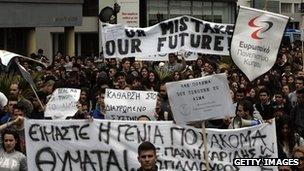Portugal and Ireland to be given more bailout repayment time
- Published

The cost of Cyprus' bailout has risen to 23bn euros
Portugal and Ireland are to be granted an extra seven years to pay back their emergency bailout loans.
The European Union and the IMF bailed out the Republic of Ireland in 2010 and Portugal in 2011.
The 17-member group that uses the euro currency agreed to the terms at a meeting of finance ministers in Dublin.
Meanwhile, the ministers also said a 10bn euro ($13bn; £8.5bn) EU bailout loan for Cyprus was ready for approval by member states.
That could happen by the end of the month and, if the IMF also gives the go-ahead, the first bailout money could be released by mid-May.
Key extension
The plan for Ireland and Portugal is intended to give the countries' financial systems more time to recover from the debt crisis after their bailout loans run out.
Ireland's bailout money will run out later this year, and Portugal's will run out in 2014.
The Irish and Portuguese repayment extensions are expected to be backed by all 27 European Union members, which includes those outside the eurozone, later on Friday.
Eurogroup President and Dutch Finance Minister, Jeroen Dijsselbloem, said the ministers in Dublin had commended Portugal on its success in implementing the bailout programme but "asked them to maintain the reform momentum despite the difficult economic and domestic conditions".
He added: "Ireland is a living example that adjustment programmes do work, provided there is a strong ownership and genuine commitment to reforms."
The BBC's Matthew Price said that the deal could be seen as something of a reward "for good behaviour", but also as recognition that an austerity-first approach was not always the best option.
The extension is especially important for Portugal. When it received a 78bn euro bailout two years ago, it pledged to take various measures in its budget to reduce public spending.
However, last week the country's Constitutional Court ruled that several of these measures in the 2013 budget were unlawful.
If Portugal was to drop the measures because of this, it may not remain eligible for more funds under its bailout.
Cyprus crisis
On Thursday, it emerged that Cyprus would need to raise an extra 6bn euros to secure the 10bn euro bailout from Brussels and the IMF.
The BBC's Matthew Price says Ireland and Portugal could be seen as getting a reward "for good behaviour"
While confirming that up to 10bn euros in loans will be provided to Cyprus, the eurozone finance ministers also rejected reports that the country might be granted more financial assistance.
Presidential spokesman Christos Stylianides said the country was not looking for more money under the bailout programme, but was hoping for support through other European support mechanisms: "What the president of the republic [of Cyprus] is discussing with European officials is the possibility of increasing European funds for growth and social cohesion."
Cyprus will ask for the money under the EU's multi-annual financial framework designed for member states suffering serious consequences from the euro crisis.
A draft document prepared by the country's creditors said the cost of the rescue had risen to 23bn euros from 17.5bn euros, with Cyprus now having to find 13bn euros of this.
Mr Anastasiades said he had spoken to EU Economy and Euro Commissioner Olli Rehn and said he would also be writing to European Commission chief Jose Manuel Barroso and to EU President Herman Van Rompuy.
"The letter to Mr Barroso and Mr Rompuy will refer to the need for EU policy to change towards Cyprus by giving it extra assistance, given the critical times we are going through as a result of the economic crisis and the measures imposed on us," Mr Anastasiades said.
Meanwhile, the German government said that the size of the eurozone bailout for Cyprus would not rise.
"The contribution from international creditors will not change," said German government spokesman Steffen Seibert, noting that 10bn euro package was "already very large".
It is expected that Cyprus will sell much of its gold reserves to help fund its side of the bailout. Also, bank depositors with more than 100,000 euros in savings will bear part of the cost of the rescue.
The bank sector on which much of the Cypriot economy was dependent is shrinking, and thousands of jobs are being lost.
Laiki Bank is being wound up and its healthy assets transferred to the Bank of Cyprus.
Slovenia plan
Eurozone officials meeting in Dublin also reviewed Slovenia's growing problems.
There will be no discussion at the meeting of finance ministers, and the country will not make an application for bailout funds.
But the country's prime minister, Alenka Bratusek said on Friday that her government will have a plan that should stave off the need for a bailout ready to put to the country's parliament within two weeks.
The plan is expected to include the selling off of state assets, probably including a bank.
Slovenia, which adopted the euro single currency in 2007, has been forced to recapitalise its main banks and the economy is struggling.
- Published11 April 2013
- Published18 April 2013
- Published27 March 2013
- Published11 April 2013
- Published2 April 2013
- Published4 April 2013